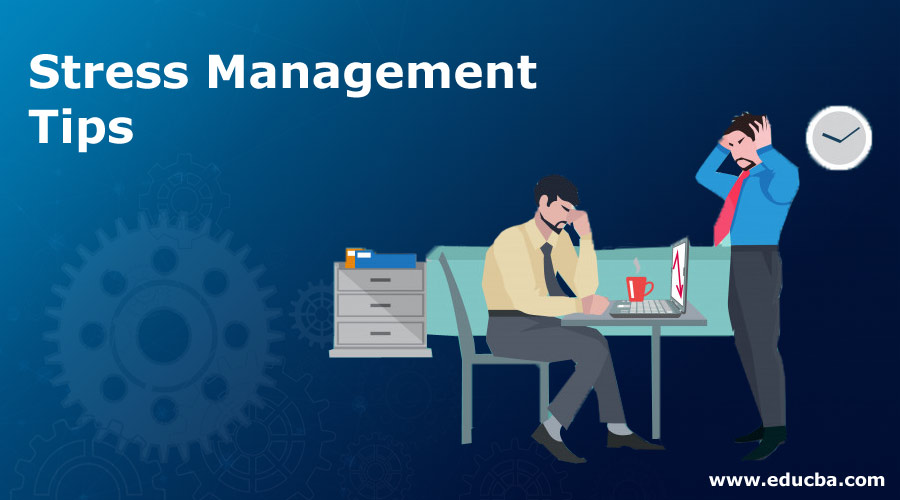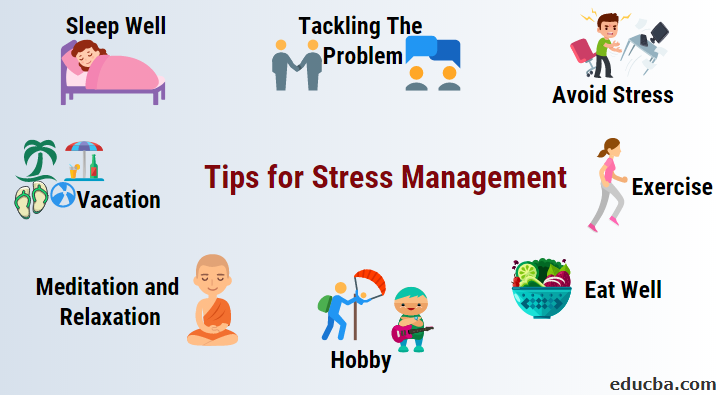Updated June 19, 2023
Introduction to Stress
The following article provides an outline for Stress Management Tips. Stress is a situation that has an adverse and unpleasant impact on the body. It is external or internally generated. Either way, the body experiences unpleasantness, hormones are released into the system, and the body and mind seem on edge.
It is the reaction of your mind and body to a potentially dangerous situation, followed by the release of hormones like adrenalin and cortisol. A person feeling stress finds his/her muscles tensing, heartbeats increase, and breathing increases rapidly. It can affect everyone from a student to a working professionals; no one is immune from stress today. Though it seems inevitable, one can learn to manage stress in his life and that he can lead a healthy life.
Types of Stress
Stress can be complicated and confusing; let us look at some of the types of stress:
- Routine Stress: This is the most basic type of stress that almost everyone goes through daily and is related to daily office work, family life, and other routine tasks that a person performs.
- Sudden Stress: This type of stress is brought on by sudden events like fear of job loss, death in the family, accidents, unpaid debt, etc.
- Traumatic Stress: This occurs when the person faces with life and death situation and is in danger of being seriously hurt or even killed, like assault, a major accident, or going to war. Soldiers returning from war often face post-traumatic stress disorder; it takes a lot of time to heal them psychologically and should be done by a psychiatrist.
Categories of Stress
Stress can also be divided into categories based on how severe or chronic it is:
- Acute Stress: This is the most common form of stress. It arises from the memory of any past unpleasant experience. Or even worry about the future, like how one will get out of a problem, earn his livelihood, fear losing loved ones, and so on. This type of stress leads to emotional disturbances, physical ailments like pain in the head and body, and even bigger diseases.
- Episodic Acute Stress: A person suffering from acute stress can have episodic acute stress. Such a person is irritable, short-tempered, anxious, and tense.
- Chronic Stress: This type of stress persists and gradually wears a person down for a very long time. It can come from unrelenting demands and pressures and stem from traumatic early childhood experiences. Long-term attrition depletes physical and mental resources, making the treatment of chronic stress symptoms difficult and necessitating extended medical care.
Tips for Stress Management
However, to live a healthy and fruitful life, one needs to take control of stress rather than having stress control their life.
Below are some helpful tips that one can use to manage the stress level in their life.
1. Tackling the Problem
Before finding solutions to stress management, a person needs to identify the root cause of his stress. Is it a person, place, or thing that is the constant source of his stress?
Also, a person must understand whether the problem is real or imaginary. If the problem cannot do physical harm, it is most likely in the person’s head and can be dealt with by adjusting their thought process.
2. Avoid Stress
This is easier said than done; if a person knows that something is a constant source of stress in their life, they should avoid it, like a stressful job or a person. A person should also avoid places where he is more likely to get into trouble. And overall, keep a distance from things that upset him.
3. Exercise
Exercise is very important in managing stress; exercising daily helps control the stress level and maintain a healthy mind and body. People don’t feel like exercising when they are stressed, when in fact, that is exactly what they need, so make a habit of exercising regularly.
4. Meditation and Relaxation
Yoga helps in managing stress a lot. Meditation by deep breathing brings the body to a relaxed state; the mind does not think about the problem but focuses on the breath. Yoga teaches various breathing techniques that instantly make you feel better and relaxed. A person should have a mix of yoga and gym exercise in their schedule as this will greatly help the mind and body.
5. Eat Well
A person’s diet also plays a very important role in managing stress. If a person eats oily and fatty food in the morning, the body undergoes a lot of stress to digest such foods. And when the body is stressed emotionally, a person feels stressed too. Eating a light meal with vegetables and fruits helps keep the body light. Junk food should be avoided as much as possible.
6. Sleep Well
Today jobs have become very stressful; people spend close to 12-12 hours a day in their office; this does not leave them time to exercise, meditate, and even get sufficient sleep. Therefore, sleep disorders are the most dangerous sources of stress.
Some tips to sleep well are as follows:
- Try sleeping at the same time every day.
- Exercise 3-4 hours before bedtime; this will give the body ample time to cool down. Once the body is cooled, a person finds to easy to sleep.
- Avoid watching television, writing emails, or browsing the phone before bedtime.
7. Vacation
A lot of time, changing the surroundings and place helps manage stress; try to go on a vacation to a calm and quiet place. A relaxing environment will instantly put the body in a relaxing state.
8. Hobby
A person should pursue his hobby, whatever it may be. Doing what you like puts you in a good mood. A positive frame of mind helps a person deal with unwanted and stressful thoughts.
Thus we would like to conclude this article by stating stress is a silent killer; if not kept in check over long periods, it can damage your body, mind, and overall well-being.
Recommended Articles
This has been a guide to Stress Management Tips. Here we have discussed the types, categories, and various tips for Stress Management. You can also go through our other suggested articles to learn more –


